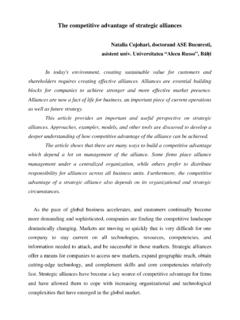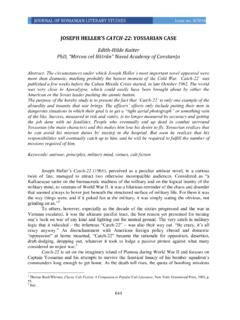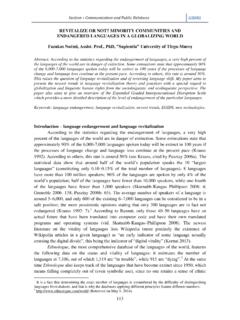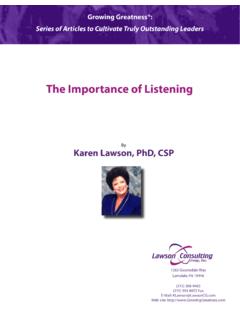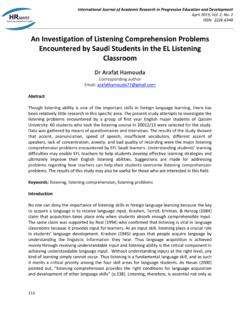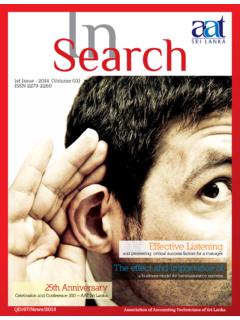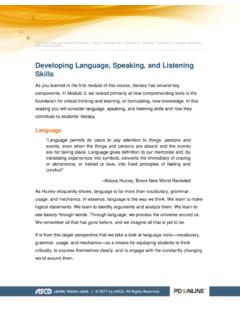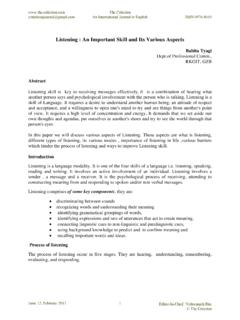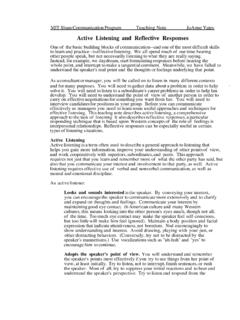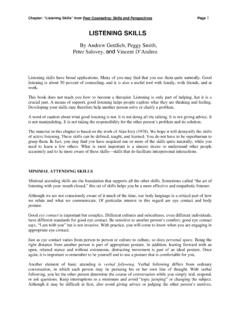Transcription of THE IMPORTANCE OF LISTENING IN INTERPERSONAL ... - UPM
1 Iulian BOLDEA, Cornel Sigmirean (Editors), DEBATING GLOBALIZATION. Identity, Nation and Dialogue Section: Communication, Public Relations, Education Sciences 281 Arhipelag XXI Press, T rgu Mure , 2017, e-ISBN: 978-606-8624-01-3 THE IMPORTANCE OF LISTENING IN INTERPERSONAL COMMUNICATION Veronica P stae Lecturer, PhD, Carol I National Defence University, Bucharest Abstract: In the present article we shall expand on the IMPORTANCE of LISTENING as a major INTERPERSONAL skill. We shall review some definitions of LISTENING in the literature and we shall underline its usefulness in INTERPERSONAL communication.
2 Quite often, people feel a sense of frustration that they are only heard, but not really listened to. That is why we shall emphasize the role of effective LISTENING in our interactions, showing that there are fields of activity, such as people oriented domains, in which being a good listener or not makes a great difference. We listen to others because we want to learn or to know where we stand in a situation or within a group. We also listen to other people because we want to offer moral support and advice. Thus, in the end we shall offer some suggestions for improving one s LISTENING skill since this can improve our INTERPERSONAL communication and, finally, the quality of our lives.
3 Keywords: INTERPERSONAL communication, message, LISTENING , good listener, effective LISTENING 1. Introduction Sooner or later in our lives, we have all asked questions like: Hey, are you LISTENING to what I m saying?Am I talking to the walls, here?, which proves that sometimes we realize that we are only heard, but not really listened to. Hence, in what follows we shall approach the issue of LISTENING to others as one of the most consequential INTERPERSONAL skills. We shall argue that there are fields of activity in which LISTENING plays a crucial role in the outcome of human interactions and we shall put forward some ways in which one s LISTENING skill could be improved.
4 The core of the issue is that two or more people could hear the same message, but could understand very different things from what is conveyed, which proves that we listen to and interpret reality in a very personal manner. What we understand from a message goes through several filters such as the culture we belong to, our education, our life experiences, our gender, social status, etc. However, being able to listen effectively helps us carry out instructions and fulfill the tasks we have been assigned and finally, it may help us avoid dangers, saving our lives.
5 Though one may think that LISTENING comes as naturally as breathing, this is an illusion. Only hearing is innate, LISTENING is not. There is evidence that some people are far better listeners than others, but the good news is LISTENING can be learned and trained like any other skill, because good communicators persevere and learn from their own mistakes. 2. The LISTENING skill in the context of INTERPERSONAL communication To begin with, there is a big difference between hearing and LISTENING .
6 Hearing is one of the human senses, it is physiological and does not necessarily imply the understanding of the aural input. We can passively hear sounds produced by people, animals and objects, which we Iulian BOLDEA, Cornel Sigmirean (Editors), DEBATING GLOBALIZATION. Identity, Nation and Dialogue Section: Communication, Public Relations, Education Sciences 282 Arhipelag XXI Press, T rgu Mure , 2017, e-ISBN: 978-606-8624-01-3 may not able to make sense of, we may hear people speaking foreign languages which we do not know, or we may hear people speaking our own language, but choose not to pay attention since we are not interested in the topic or the speaker.
7 This is hearing; LISTENING , nonetheless, goes far beyond the mere perception of the sounds around us. According to the International LISTENING Association (ILA), hearing is accidental, involuntary and effortless, whereas LISTENING is focused, voluntary and Literature in the field underlines that the big difference between the two lies in the active nature of LISTENING . P. Emmert argues that LISTENING is the active process of making meaning out of another person s spoken message2. L. Steil emphasizes the interaction between the interlocutors, defining LISTENING as the complex, learned human process of sensing, interpreting, evaluating, storing and responding to oral messages 3.
8 This definition illustrates the IMPORTANCE of the listener s role and conduct for the success of the interaction. However, other approaches go beyond the mere interpretation of the spoken message and claim that a good listener also pays careful attention to nonverbal communication. According to R. Bostrom, the most appropriate definition of LISTENING is the acquisition, processing, and retention of information in the INTERPERSONAL context .4 Van Slyke also stresses the awareness and active participation of the listener, and argues that LISTENING is the process of becoming aware of all the cues that another person emits 5.
9 It follows that during our interaction with the others, LISTENING involves paying attention to both verbal and nonverbal messages. Along the same lines, Hargie and Dickinson claim that efficient LISTENING involves taking into consideration the nonverbal cues, as well: LISTENING is (..) the process whereby one person pays careful overt and covert attention to, and attempts to assimilate, understand, and retain, the verbal and nonverbal signals being emitted by another 6. Thus, no matter if the above scholars include the decoding of nonverbal messages in their definitions of LISTENING or not, it is clear that this process requires focus on sender, and attention to his words, tone, body language, etc.
10 Consequently, a good listener will be able to notice the interplay between the sender s verbal and non-verbal messages so as to perceive what is totally or partially transmitted, or what is left unspoken. 3. Benefits of effective LISTENING The IMPORTANCE of LISTENING for our interaction with other people cannot be emphasized enough, both at personal and professional levels. Ever since we are born, we start learning by seeing, hearing and LISTENING . Thus, LISTENING becomes the understructure on which other communication skills are built.


